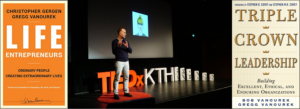Article Summary:
Most people don’t do an annual life review. Many don’t know where to begin. Here we guide you through 7 straightforward but powerful questions that will help you take stock and plan for the year ahead—a powerful self-leadership practice.
+++
Most people do annual performance reviews at work, but very few people do an annual life review. That’s odd. Why not check in on how things are going in your life?
With an annual life review, you can gain clarity about how things are really going in your life, seeing the big picture more clearly. You can spot patterns—even subtle, hidden ones—that reveal what’s helping you thrive and what’s holding you back.
Most importantly, doing a life review sets you up for action and momentum so you can start the new year with focus and intention.
7 Questions to Ask in Your Annual Life Review
One reason many people don’t do an annual life review is that they don’t know how. It doesn’t have to be complicated.
In fact, it can be as simple as asking yourself the following seven questions and writing down the answers.*
1. Highlights: What were the highlights of this past year?
Look back across your year and document the moments, relationships, and accomplishments that mattered most—the high points. By revisiting your calendar and/or photos, you’ll rediscover forgotten highlights.
2. Challenges: What were the top challenges from this past year?
Next, document the challenges you faced and where you fell short of what you had hoped for. Naming them can be cathartic. And reminding yourself of what you endured can be powerful evidence of your tenacity and resilience.
3. Habits: Which habits are helping me thrive, and which are holding me back?
Reflect on your habits and daily routines—both the ones that lift you up and the ones that hold you back. Doing so helps you decide what to keep, adjust, or let go of as you move forward.
4. Aspirations: What are my top aspirations for next year?
Next, note your hopes and dreams for the year ahead across all areas of life—from health and relationships to work, learning, and personal growth. Focus on what matters most to you and consider what would make the next year fulfilling and fun.
5. Gratitude: What am I most grateful for from this year?
Now, focus on the people, moments, and experiences you’re most grateful for—including those that brought you the most joy. Take time to celebrate and savor the positives in your life.
6. Take-Aways: What are my top take-aways from this review process?
Finally, step back and look for patterns. Notice what drove your highs and lows, the lessons learned, and the insights that can make next year even better.
7. Top Focus: What will be my top focus for the coming year?
Determine your top focus for the year ahead—the one area that, if prioritized, could make the biggest difference in your life. Focusing here gives you clarity, direction, and a guiding star for your actions. (It can also help you decide what you should stop doing or politely decline.)
That’s it. Seven powerful questions to take stock and set you up for success in the new year. See below for my Annual Life Review Template.
Annual Life Review Template
Annual Life Review
Reflect on the past year and clarify what matters most for the year ahead.
1. Highlights
What stood out as the best moments or wins from this past year?
2. Challenges
What were the most significant obstacles or difficulties I faced?
3. Habits
Which habits supported my growth, and which ones limited it?
4. Aspirations
What do I most want to create, pursue, or become in the year ahead?
5. Gratitude
What am I deeply grateful for from this past year and what brought me joy?
6. Key Takeaways
What insights or lessons emerged from this reflection?
7. Primary Focus
What single focus will matter most in the coming year?
Conclusion: How to Do an Annual Life Review
As you go through this process, give yourself grace. Don’t expect a perfect year. That’s a fool’s errand.
Instead, focus on honoring your real year—messiness and frustrations included. Approach the process with curiosity and self-compassion. And with thanks and wonder. Let insight replace self-criticism. Guard your heart and have faith.
Pro Tip: This process is helpful when done alone but much richer when you do it with others. Share your annual life review with someone you trust. Even better, exchange reviews and discuss them together. Doing so can deepen your connection. Together you can brainstorm creative new ideas, provide encouragement, and hold each other accountable for your chosen commitments.
In the end, doing an annual life can bring more clarity and insight to your life. A renewed sense of agency. And determination to keep learning and growing. It lays the groundwork for action and momentum, helping you enter the new year ready to thrive.
Wishing you well with it—and let me know if I can help.
–Gregg
Tools for You
- Traps Test (Common Traps of Living) to help you identify what’s getting in the way of your happiness and quality of life.
- Quality of Life Assessment so you can discover your strongest areas and the areas that need work, then act accordingly.
- Personal Values Exercise to help you determine and clarify what’s most important to you
Related Articles
- “Why You Should Do an Annual Life Review—And How”
- “How to Break Bad Habits and Create Good Ones”
- “Renewing Yourself Amidst the Chaos”
- “The Power of Taking Full Responsibility for Your Life”
- “Are You Drifting through Life?”
- “Avoid These New Year’s Resolution Pitfalls”
- “Goals Guide: Best Practices in Setting and Pursuing Goals”
- “The Leadership Reset You Need for the New Year”
Appendix: Additional Life Review Questions (Extra Credit)
For most people, answering the seven questions above will be enough. But if you want to go deeper, here are eight more targeted questions you can ask to turbocharge your annual life review:
1. Quality of Life: In what areas is my quality of life high, and which ones need work? (Resource: Quality of Life Assessment.)
2. Traps of Living: What are the top things that are inhibiting my happiness and fulfillment? (Resource: Traps Test.)
3. Purpose: To what extent am I living purposefully, and what more will I do? (Resource: “How to Discover Your Purpose.”)
4. Values: To what extent am I building my life around what’s important to me and upholding my deeply held beliefs, and what more will I do? (Resource: Personal Values Exercise.)
5. Vision: To what extent am I working toward my vision of the good life (a bold and vivid picture of my desired future), and what more will I do? (Resource: “How to Craft a Vision of the Good Life.”)
6. Strengths: To what extent am I using my core strengths (the things at which I most excel) in my life, and what more will I do? (Resource: Strengths Search.)
7. Passions: To what extent am I building my passions (the things that consume me with palpable emotion over time) into my life, and what more will I do? (Resource: Passion Probe.)
8. Goals: To what extent am I clear about the desired results I’d like to achieve and organizing my life and time accordingly? What more will I do on this front? (Resource: Goals Guide: Best Practices in Setting and Pursuing Goals.)
Postscript: Inspirations on How to Do an Annual Life Review
- (Doing a personal annual review) “will be your highest leverage activity all year long.” -Matthias Frank, writer
- “The unexamined life is not worth living.” -Socrates
- “When you review your year as a whole, seemingly unrelated parts of your life come into focus at once, enabling you to connect the dots.” -Fadeka Adegbuyi, writer
- “Without reflection, we go blindly on our way, creating more unintended consequences, and failing to achieve anything useful.” –Margaret J. Wheatley, writer and teacher
- “There is one art of which people should be masters—the art of reflection.” -Samuel Taylor Coleridge, English poet, philosopher, and theologian
- “Follow effective action with quiet reflection. From the quiet reflection will come even more effective action.” -Peter Drucker, consultant and author
* It’s important to write down your answers for several reasons. For example, it gives you a record to review. You can compare years and assess progress. Also, it’s easier to track your progress and hold yourself accountable when you have a written starting point.
+++++++++++++++++
Gregg Vanourek is a writer, teacher, and TEDx speaker on personal development and leadership. He is co-author of three books, including LIFE Entrepreneurs: Ordinary People Creating Extraordinary Lives (a manifesto for living with purpose and passion) and Triple Crown Leadership: Building Excellent, Ethical, and Enduring Organizations (a winner of the International Book Awards). He has worked for market-leading ventures and given talks or workshops in 8 countries. Check out his Crafting Your Life & Work online course or get his monthly newsletter. If you found value in this article, please forward it to a friend. Every little bit helps!






















